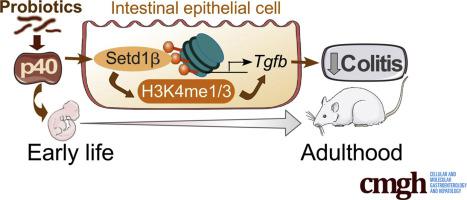Cellular and Molecular Gastroenterology and Hepatology ( IF 7.1 ) Pub Date : 2021-01-19 , DOI: 10.1016/j.jcmgh.2021.01.004 Yilin Deng 1 , Oliver G McDonald 2 , Anna L Means 3 , Richard M Peek 4 , M Kay Washington 5 , Sari A Acra 1 , D Brent Polk 6 , Fang Yan 1

|
Background & Aims
Colonization by gut microbiota in early life confers beneficial effects on immunity throughout the host’s lifespan. We sought to elucidate the mechanisms whereby neonatal supplementation with p40, a probiotic functional factor, reprograms intestinal epithelial cells for protection against adult-onset intestinal inflammation.
Methods
p40 was used to treat young adult mouse colonic (YAMC) epithelial cells with and without deletion of a methyltransferase, su(var)3-9, enhancer-of-zeste and trithorax domain–containing 1β (Setd1β), and mice in early life or in adulthood. Anti–transforming growth factor β (TGFβ)-neutralizing antibodies were administered to adult mice with and without colitis induced by 2,4,6-trinitrobenzenesulfonic acid or dextran sulfate sodium. We examined Setd1b and Tgfb gene expression, TGFβ production, monomethylation and trimethylation of histone H3 on the lysine 4 residue (H3K4me1/3), H3K4me3 enrichment in Tgfb promoter, differentiation of regulatory T cells (Tregs), and the inflammatory status.
Results
p40 up-regulated expression of Setd1b in YAMC cells. Accordingly, p40 enhanced H3K4me1/3 in YAMC cells in a Setd1β-dependent manner. p40-regulated Setd1β mediated programming the TGFβ locus into a transcriptionally permissive chromatin state and promoting TGFβ production in YAMC. Furthermore, transient exposure to p40 during the neonatal period and in adulthood resulted in the immediate increase in Tgfb gene expression. However, only neonatal p40 supplementation induced the sustained H3K4me1/3 and Tgfb gene expression that persisted into adulthood. Interfering with TGFβ function by neutralizing antibodies diminished the long-lasting effects of neonatal p40 supplementation on differentiation of Tregs and protection against colitis in adult mice.
Conclusions
Exposure to p40 in early life enables an epigenetic imprint on TGFβ, leading to long-lasting production of TGFβ by intestinal epithelial cells to expand Tregs and protect the gut against inflammation.
中文翻译:

早期接触 p40 通过诱导 TGFβ 的长期表观遗传印记来预防成年期的肠道炎症
背景与目标
早期肠道微生物群的定植对宿主整个生命周期的免疫力产生有益影响。我们试图阐明新生儿补充 p40(一种益生菌功能因子)重新编程肠道上皮细胞以防止成人发病的肠道炎症的机制。
方法
p40 用于治疗年轻成年小鼠结肠 (YAMC) 上皮细胞,无论是否缺失甲基转移酶、su(var)3-9、enhancer-of-zeste 和 trithorax 结构域 - 含 1β (Setd1β),以及生命早期的小鼠或成年后。对 2,4,6-三硝基苯磺酸或葡聚糖硫酸钠诱导的有和没有结肠炎的成年小鼠施用抗转化生长因子 β (TGFβ) 中和抗体。我们检查了Setd1b和Tgfb基因表达、TGFβ 产生、组蛋白 H3 在赖氨酸 4 残基 (H3K4me1/3) 上的单甲基化和三甲基化、Tgfb启动子中 H3K4me3 的富集、调节性 T 细胞 (Tregs) 的分化和炎症状态。
结果
p40 上调YAMC 细胞中Setd1b的表达。因此,p40 以 Setd1β 依赖性方式增强 YAMC 细胞中的 H3K4me1/3。p40 调节的 Setd1β 介导将 TGFβ 基因座编程为转录许可的染色质状态并促进 YAMC 中 TGFβ 的产生。此外,在新生儿期和成年期短暂暴露于 p40 导致Tgfb基因表达立即增加。然而,只有新生儿 p40 补充诱导了持续到成年的 H3K4me1/3 和Tgfb基因表达。通过中和抗体干扰 TGFβ 功能可降低新生儿 p40 补充剂对成年小鼠 Treg 分化和预防结肠炎的长期影响。
结论
在生命早期暴露于 p40 可以在 TGFβ 上留下表观遗传印记,从而导致肠上皮细胞长期产生 TGFβ,以扩大 Tregs 并保护肠道免受炎症。











































 京公网安备 11010802027423号
京公网安备 11010802027423号